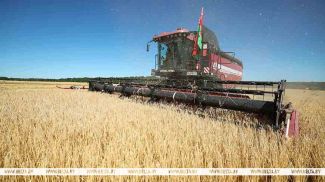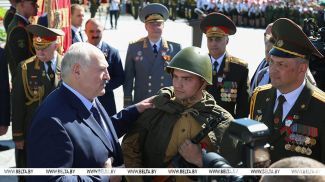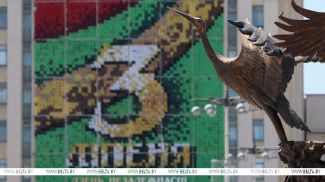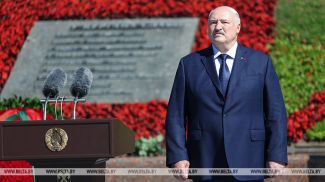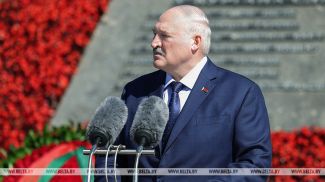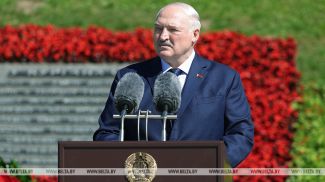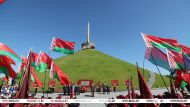MINSK, 7 October (BelTA) – Belarus President Aleksandr Lukashenko took part in an informal summit of the heads of state of the Commonwealth of Independent States in St Petersburg on 7 October.
Apart from the Belarusian head of state Russia's northern capital welcomed Azerbaijan President Ilham Aliyev, Armenia Prime Minister Nikol Pashinyan, Uzbekistan President Shavkat Mirziyoyev, Tajikistan President Emomali Rahmon, Kazakhstan President Kassym-Jomart Tokayev, and Turkmenistan President Serdar Berdimuhamedow. Naturally President of Russia Vladimir Putin greeted all of them as the host of the informal summit.
As he welcomed participants of the meeting, Vladimir Putin remarked that they represent countries, which are the closest friends and allies of Russia due to a huge number of circumstances and historical reasons. “We are connected by relations of genuine strategic partnership with them. We are intent on working together with them to build cooperation in the spirit of good neighborhood, mutual benefits, and accommodation of each other's interests. Such informal meetings of CIS leaders in Russia's northern capital are becoming a good tradition and allow exchanging opinions about the matters that are most topical for all of our countries in a calm and friendly setting,” the Russian president said.
By the way, the state leaders will meet once again next week in Kazakhstan's capital Astana where a number of international forums will take place. One of them is a full-fledged session of the CIS Heads of State Council. Kazakhstan presides over the Commonwealth of Independent States now. The informal summit in St Petersburg offered an additional opportunity to compare notes. Vladimir Putin said: “The Kazakh presidency has submitted truly important matters of integration interaction in politics, economy, and humanitarian affairs to the session's agenda. As usual a respectable package of joint documents is being prepared for approval.”
“Coincidence? I think not”
And yet the summit in St Petersburg was informal. The date of the summit coincided with Vladimir Putin's 70th birthday. There is no doubt the leaders of the countries always have something to talk about. There are many problems inside and outside the Commonwealth of Independent States. But the heads of state took the opportunity to congratulate the Russian leader on his birthday. Once a door of the car (by the way, it was a Russian Aurus) bearing the standard of the Belarus president opened upon arrival at the summit venue – the National Congress Palace, Aleksandr Lukashenko was surrounded by local reporters.
“What did you bring as a gift if you don't mind asking?” the reporters wondered.
“A tractor,” Aleksandr Lukashenko responded.
When asked to clarify what kind of a tractor, the president noted: “The one that I use, which is a BELARUS tractor. The best one. A hand-built one.”
The Telegram channel Pul Pervogo posted a photo of the certificate for Vladimir Putin's tractor. It is a BELARUS 1523.3 tractor. “To President of the Russian Federation Vladimir Putin on the occasion of the jubilee,” the certificate reads.
“With all the attachments?” the journalists kept asking while referring to the tools that can be attached to the tractor for various operations.
“There are a million of them, you know. Therefore, this is optional. But I will offer him one attachment - a seeder. We will sow grain, maybe something else. It is multi-purpose. We will grow food, so that [Poland President Andrzej] Duda, [Poland Prime Minister Mateusz] Morawiecki, Europe would not starve and would not steal bread from Ukraine, but bring it to poor countries,” Aleksandr Lukashenko replied.
It was not the first time when the Belarus president had shown care for western neighbors. BelTA reported earlier that in September before he left for Uzbekistan to participate in a Shanghai Cooperation Organization summit Aleksandr Lukashenko spent a morning chopping firewood together with the businessman Sergei Teterin. “We will not let Europe freeze to death! We will help out our brothers. They may return the favor some day,” Aleksandr Lukashenko said as he was skillfully chopping wood with his axe.
Sergei Teterin had trouble chopping his share of firewood. “Fir wood is so sappy,” he remarked as he tried to chop another wood block.
“Indeed it is. Well, listen. Europe cannot be a chooser now: fir or birch. To stay warm is what matters. We should think about giving it to peasants, workers instead of rich people. And most importantly we don't want Duda and Morawiecki in Poland to freeze to death,” the head of state emphasized.
However, let's get back to the summit in St Petersburg. The talk about the tractor alone made the summit quite informal. And before that the reporters had had a chance to admire huge pyramids and compositions made of muskmelons, watermelons, and fruits grown around the National Congress Palace thanks to Tajikistan President Emomali Rahmon. Those, who have attended major official events in Tajikistan this year, are already accustomed to that. But Russia's northern capital saw such copiousness probably for the first time. Heads of state did not pass on the opportunity to pose for photos with the impressive composition in the background.
A way out of the current international situation and the threat of nuclear weapons
The meeting took place in troubled times. One can definitely say that gifts and the Russian president's birthday were not high on the agenda. It was also clear considering the other questions the reporters addressed to Aleksandr Lukashenko.
Among other things the reporters asked Aleksandr Lukashenko about his vision of a way out of the current international situation. “Why do we have to seek a way out of some international situation?” he responded. “We should not be the ones to seek a way out. We did not get stuck in it and do not intend to recover from it with some effort. They should be the ones to look [for an exit] from this international situation.”
The president pointed out that the reporters did not have all the information about what is going on. “They have been looking for a way out for a long time already,” he said.
The security of western borders of the Union State of Belarus and Russia amid the tense international situation was another question.
“You have heard their recent statements about sharing nuclear weapons with Poland. We will think it over. We have already discussed it, but we will think again how to respond. Do not worry, everything will be all right,” said Aleksandr Lukashenko.
The Belarus president mentioned the need to take measures in case nuclear weapons are deployed in Poland at a government conference held in Minsk on 6 October to discuss economic matters. He said: “Yesterday [Poland President Andrzej] Duda said this. This issue has already been looked into. Putin and I discussed it when we talked about aircraft carrying nuclear weapons. They agreed with the United States a long time ago that the arsenals will be based in Poland. What does it mean? It means that we are really facing an attack that uses tactical nuclear weapons. It is necessary to take measures. We don't have nuclear weapons. But it is not your trouble, I don't want you to stress about it.”
Polish President Andrzej Duda was quoted as saying in an interview on 5 October that his country would not mind joining the NATO nuclear sharing program. He had already discussed this topic with the U.S. authorities. The question of the possible deployment of nuclear weapons in Poland remains open for now.
Economic cooperation in the CIS and transactions in national currencies
The person celebrating the anniversary – President of Russia Vladimir Putin – set quite a serious mood of the meeting with his opening remarks.
Vladimir Putin said: “Certainly during the current meeting and at the Astana summit we will pay close attention to further advancement of trade and investment partnership within the framework of the Commonwealth of Independent States. We will think about ways to invigorate the joint work to bolster the stability of all our economies, in particular, by enhancing bilateral and multilateral manufacturing cooperation ties, by ensuring technological sovereignty.”
Vladimir Putin stressed that economic cooperation between the CIS countries is expanding. In his words, Russia's trade with the CIS states increased by over 30% to $96 billion in 2021 and by another 7% in H1 2022. “I am convinced that more vigorous transition to national currencies in mutual transactions between the CIS states will allow amplifying such positive trends. Actually we've been doing it for many years already. And not because of some fleeting political situation. On the whole it will contribute to the enhancement of sovereignty of our states, to the development of the domestic capital markets, and to tighter regional economic integration,” he said.
Ukraine and other security problems
Vladimir Putin also suggested discussing matters relating to the ensuring of security in the CIS space during the informal summit. “Because in addition to Ukraine where truly tragic events are happening, regretfully, conflicts sometimes happen between other close countries of the post-Soviet space. There is no doubt that it is necessary to work out measures to resolve those conflicts,” he said.
It was quite a not-so-subtle hint at the history of conflict between Azerbaijan and Armenia, for instance. By the way, Azerbaijan President Ilham Aliyev and Armenia Prime Minister Nikol Pashinyan were sitting at the same table then. It was a good occasion as any to try and find ways to resolve some problems albeit at an informal summit.
The recent September conflict at the border between Kyrgyzstan and Tajikistan comes to mind due to what Vladimir Putin said.
It is worth noting that Kyrgyzstan President Sadyr Japarov could not come to St Petersburg to participate in the informal summit. His press secretary explained the decision by referring to the president's extremely busy schedule. But then it will be possible to discuss all the problems in Astana next week.
In St Petersburg Vladimir Putin also stressed it is important to exchange opinions about the promotion of cooperation in fight against terrorism and extremism, crimes, illegal turnover of narcotics, and corruption.
Promotion of the Russian language
At the beginning of the meeting Vladimir Putin noted with satisfaction that Kazakhstan President Kassym-Jomart Tokayev had suggested setting up an international organization for the sake of supporting and promoting the Russian language under the aegis of the Commonwealth of Independent States. The Russian leader said: “We are very grateful to President Tokayev for it. I think it is important for everyone because Russian is undoubtedly a language of interstate communication. Without a doubt there are practical applications, too – without an exaggeration millions of citizens of CIS states work in Russia and help Russia implement development plans while earning money to support their families.”
Vladimir Putin went on saying: “We certainly support the Kazakhstan president's proposal and, on our part, will do everything to implement it as soon as possible. Including bearing in mind that the year 2023 has been declared the Year of Russian language as an interethnic language in the Commonwealth of Independent States.”
It is worth noting that Belarus President Aleksandr Lukashenko has repeatedly emphasized the Belarusian nation's contribution to the development of the Russian language. For instance, in March 2019 when he met with representatives of the general public and the expert community, Belarusian and foreign mass media Aleksandr Lukashenko noted: “Belarusian is my mother tongue. Just like Russian is. The Russian language is our language.” The president stressed he would not want to set the languages against each other since both are mother tongues for Belarusian citizens.
Back then Aleksandr Lukashenko noted that Belarusians had made a huge contribution to the development of the Russian language like no other nation had. As an example he referred to a Russian language academic excellence competition. The competition had been held in Russia and Belarusian participants had won all the nominations. In his opinion, this legacy should not be rejected.




